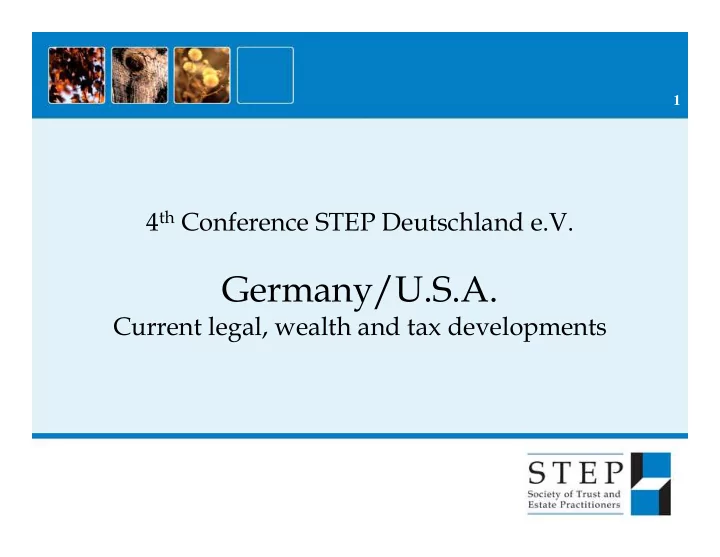

1 4 th Conference STEP Deutschland e.V. Germany/U.S.A. Current legal, wealth and tax developments
2 Bringing Non-Compliant U.S. Taxpayers Back into the System Michael G. Pfeifer Caplin & Drysdale, Chartered Washington, DC
Scope of U.S. Tax Reporting 3 Reporting by U.S. Citizens and Residents � Income tax return on Form 1040 � Tax information returns – foreign activities � Foreign corporations – Forms 5471 and 8621 � Foreign partnerships – Form 8865 � Foreign „disregarded entities“ – Form 8858 � Foreign trusts – Forms 3520 and 3520-A � Non-tax information returns � Foreign financial accounts – Form TDF 90-22.1 („FBAR“) �
Scope of U.S. Tax Reporting 4 Reporting by Nonresident Aliens � Income tax return on Form 1040NR � Effectively connected income � U.S. source income � Withholding tax certifications � Forms W-8BEN et seq. � Forms 1042 and 1042-S � Possible need of Tax Identification Numbers � ITIN – Form W-7 � EIN – Form SS-4 �
Current Offshore Enforcement Climate 5 Unreported Offshore Financial Accounts – the FBAR � Crisis Bank Julius Baer and WikiLeaks.org � LGT Bank in Liechtenstein � Financial and tax reforms promised � UBS � Birkenfeld clients � Announced limitations on U.S.-related business � Senate Permanent Subcommittee on Investigations Hearings � Possible enactment of Stop Tax Haven Abuse Act (S. 681) �
IRS Voluntary Disclosure Policy 6 5 Key Conditions for Good “V.D.” � Legal source � Assets can’t derive from unlawful activity � Disclosure must be timely � Before IRS has opened civil or criminal file or is in receipt of third � party information Disclosure must be complete � Taxpayer must file true and accurate amended or delinquent � returns; can’t correct past failures “selectively” Good faith efforts to pay tax and interest due �
IRS Voluntary Disclosure Policy 7 Taxpayer must fully cooperate � Full audit unlikely but must comply fully with tax and related � filings, e.g., FBAR’s No promise of immunity but generally no prosecution � Penalties frequently abated without show of “reasonable cause” if � good faith effort Manner of proceeding � Depends on circumstances and seriousness of issues � Generally file 3 or 6 years of amended or delinquent returns � In serious cases, walk through with IRS (the “open kimono”) �
When Voluntary Disclosure Fails 8 Difference in burden of proof � Civil standard � IRS position presumed correct � Taxpayer must disprove by preponderance of evidence � Criminal standard � Taxpayer presumed innocent � IRS must prove each element of crime “beyond a reasonable doubt” � When civil case goes criminal everything must be reviewed! �
Related Developments 9 U.S. has enhanced “whistle-blower” program (and new � Whistle-Blower Office) IRS has long rewarded informers providing good information on � taxpayers suspected of non-compliance Generally takes years to develop; IRS tries to protect informers’ � confidentiality; historically, rewards paid from collected proceeds might range from 1% to 15% with $10 MM “cap” Under 2006 legislation, informer gets 15-30% for good information � on corporate taxpayer with > $2 MM in of taxes, penalties and interest in dispute or individual taxpayer with > $200,000 of gross income
Related Developments 10 New standards for tax preparers � Under 2007 legislation, tax preparer standard and penalties � increased Preparer position must now generally be “more likely than not” � (i.e., > 50% chance of prevailing, if challenged) With adequate disclosure, preparer standard back to “reasonable � basis” (i.e., 25% chance) Taxpayer still has former “realistic possibility of success” standard � (i.e., one-in-three chance) New standard applies to some information returns, if taxpayer � willfully understates tax or acts with reckless disregard of law Congress, Treasury considering further change �
11 Bringing Non-Compliant U.S. Taxpayers Back into the System Michael G. Pfeifer U.S. Caplin & Drysdale, Chartered One Thomas Circle, N.W., Ste. 1100 Washington, DC 20005 www.caplindrysdale.com (202) 862-5000 (202) 429-3301
Recommend
More recommend